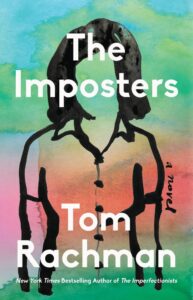
On the Pitfalls of Book Promotion in the Internet Age
For Tom Rachman Being a Novelist “Retains a Shimmer of Prestige with Only a Glimmer of the Audience.”
As my flight descended over the turquoise Caribbean, I asked myself, Who’d go to the Cayman Islands and attend a literary event of mine? I soon learned the answer: nobody. Just empty chairs, awkward booksellers. “Maybe you could swim with stingrays tomorrow?” one suggested. “They always turn up.”
Promoting a book can derange you. After years of quiet toil and noisy typing, you clutch a published book, and step forth to meet the public, eight billion humans who, mystifyingly, seem not to know that your new novel just came out.
Occasionally, someone treats you like the important writer you long to be (but probably aren’t). They rave about your prose, and frown attentively when you speak. It’s an adrenalin shot, directly into your ego. Then you’re at a signing table, the pile of hardcovers all unsold, and everyone has gone. You’re just another needy nobody, your ego mashed underfoot.
Now and then, a literary novelist is swept to fame. But most are swept only by the polar wind of indifference. To avert oblivion, authors will twist themselves into hucksters, the spokesmodels for their books, sales rep of their inner lives.
I’d like to blame tech. I try to blame it for everything.
When the internet bulldozed the traditional press, it squashed book coverage too. But the internet flung up alternatives, from literary websites to Zoom readings to BookTok.
The skill-set for literature is not necessarily the skill-set for promoting it.
At last, novelists needn’t rely on the blessing of gatekeepers. They could shout for attention themselves. On the downside, they had to shout for attention themselves.
Publishers and agents—rarely certain why one decent book will soar when a thousand more go plop—pressured authors to become more accessible, not merely slouching through festivals and bookshops, but thrust forward for inspection on Goodreads and Twitter and reachable via direct-message. The writerly myth altered.
Previously, biographies and gossip portrayed The Novelist as a tormented character, pungent from debauchery, infidelity, booze. Now, the writers who prevailed seemed assertively nice: the endearing quirks, the correct politics.
Being beastly never made anyone a talented author. Nor does being kind to cats. My point is: the skill-set for literature is not necessarily the skill-set for promoting it.
Imagine Dostoevsky, nagged to update his Facebook page. Or Emily Dickinson at a poetry slam, posted on Instagram. Or Kafka addressing his fans on TikTok: “Hey, guys! Brutal wakeup today: I open my eyes, and I’m, like, an insect—what is up with that?! Check out my new story, #Metamorphosis. Hit ‘like,’ and subscribe below!”
*
Consider the case of Suzanne Young, author of a young-adult horror novel, who turned up for her reading in Phoenix, and found that she outnumbered the audience. Ms. Young tweeted a photo of the deserted store, with the caption, “If you ever want to see a career low point, this is it. Crying my entire way home.”
She didn’t need to sob for long. Her tweet went viral, and she ended up on NBC Nightly News, living a plot twist worthy of feel-good fiction: because nobody turned up, she had a hit.
What is the moral of her story? That the internet can save us? Or that bookstore readings are a waste, and you’re better hyping yourself online?
For today’s author, the trail of shamelessness begins before the novel is published—perhaps before it’s written. Developing an online fanbase will inhibit your writing, but your career may depend upon it. (Before her sorrowful event, Ms. Young already had more than 12,000 Twitter followers, who helped circulate her post, ultimately seen by 8 million people.)
Needless to say, when you’re promoting a book, you schlep to any event that’ll have you. The organizers are delightful; they revive your faith in contemporary literature, and restore your longing for a place in it. Then, you’re looking out from a lectern at seven people, three of whom are personal friends. You wonder if any of this makes sense.
Book events expose a fundamental flaw in promoting fiction: novelists tend to be mumblers with bad haircuts who can’t bring their writing to life before a crowd, and are inarticulate when answering questions about the craft. Some are performers; some are insightful; some, inspiring. More are the dinner guest nobody notices, but who has thoughts, and gathers them, composes them, types them in private, revises and revises—and only then, finds the words.
One of my first bookstore readings was at Politics & Prose in Washington. Beforehand, the organizers stashed me in a sideroom alongside a staffer on break, whose calm contrasted with my terror. In minutes, I’d need to declaim in public about literature. I had no right. I was an imposter.
After the event, my sister rushed over, assuring me I’d not humiliated myself. “You didn’t seem nervous at all,” she said.
“Tranquilizers,” I confided. “I took many tranquilizers.”
*
According to a recent survey, the majority of debut authors say book publication damaged their psychological health. One respondent to The Bookseller survey ended up on meds. “It has taken me a long time to reconcile the train wreck of my debut,” another reported. “I had to work hard to recover from it, both professionally and mentally.”
But writing careers have always been marked by failure more than glory. And mass indifference preceded the internet era.
Is this truly new?
When it comes to contemporary literature, you hear debates about identity and appropriation, about awards and autofiction. But what matters is the competition: those words and pictures and videos heating the device in your pocket, which vibrates so impatiently, goading you to check its stories.
While the internet is the most powerful marketing tool that writers have ever had, the internet is devastating to an art that requires close concentration.
Once, brainy types read contemporary novels for amusement, to ponder what it meant to be human, to shock themselves at what others did privately, to join the intelligentsia, to march into the debate. This role is rarely taken by a novel today.
A subculture of ultra-literary types does still rally around the latest darlings of fiction. A bigger constituency buys those selected for TV bookclubs or by prize juries. Most years, a screen-adapted novel joins the bestseller list too. But beneath those few titles are stacks and stacks of disappointment.
The study of literature dwindles too, as with the rest of the humanities. According to a report in the Sunday Times, one university had 200 English literature undergrads a decade ago; now, it’s down to 30.
When I meet bookish types with young-adult offspring, many speak of how their kids once devoured fiction, but have abandoned it. What those middle-aged bookish types are ashamed to add is that they themselves—with extensive culture and extensive bookshelves—scarcely read fiction anymore.
A culture critic told me in private that he still reviews novels because that way he is forced to read them. Authors have made similar admissions to me: “You don’t actually have time for new fiction, do you?” said one literary novelist, whose main job is teaching creative writing.
The internet is devastating to an art that requires close concentration.
Will Lloyd, a journalist at the political and literary magazine The New Statesman, noticed that he’d read plenty of books lately—and none was a novel. So, he spent a week quizzing his peers in literary circles, asking whether they read fiction, if they were discussing it, seeking it out. Among 40 people, only 2 were.
*
I feared that I was an imposter in writing. I’ve come to wonder if all literary novelists are imposters now, barging into the culture, holding up reams of pages, saying, I wrote something—look at it!
How presumptuous: engaging in make-believe, asking strangers to admire it. They too have something to say, and nowadays can, commenting, filming, liking, downvoting.
What’s odd about being a novelist today is that the position retains a shimmer of prestige with only a glimmer of the audience.
Or maybe I’m wrong. Maybe it’s just my writing that is shriveling away. Maybe I’m projecting my eclipse onto the field.
I wouldn’t fight that charge. I’m tired of fighting for attention, imploring strangers to care about what I cared about, pleading for a hearing of my voice in an art that seems quieter and quieter, that is missing the point somehow.
A New York books editor told me that publishing has always been this way: a few megahits support those below. Even writers at the top are rarely satisfied. “Look at Philip Roth. He had success after success. And he died bitter that he hadn’t won the Nobel Prize. How much is enough?”
Last week, I visited a smattering of London bookshops at the request of my British publisher. Sheepishly, I approached staff, mentioning that I was supposed to sign my new novel. They hunted down a few copies. I always feel absurd to autograph books.
But it’s thrilling too, if you don’t look down: that someone was crazy enough years ago to fly me to the Cayman Islands for a reading.
I’ve been an imposter, unsure what I was doing here, frazzled by a caterwauling, distracted, outraged world, my thoughts firing, hesitating to say them—so I put them onto paper, fighting with sentences, removing commas only to replace them, judging myself a failure, hating that I minded, despairing at my irrelevance, writing to cure myself, wanting to say something that’d make others listen, trying, trying, mostly failing.
A writer.
__________________________________

The Imposters by Tom Rachman is available from Little, Brown and Company, a division of Hachette Book Group.
Tom Rachman
Tom Rachman is the author of three novels: The Italian Teacher, The Rise & Fall of Great Powers, and the New York Times bestseller The Imperfectionists. His work has been translated into more than twenty-five languages. Born in London and raised in Vancouver, Rachman worked at the Associated Press as a foreign-news editor in Manhattan and Rome before becoming a novelist. His writing has appeared in the New York Times, The Atlantic, the Washington Post, the Wall Street Journal, The New Yorker, and elsewhere. He lives with his family in London.



















